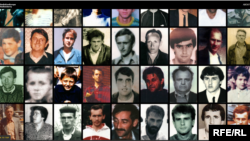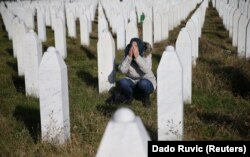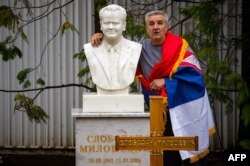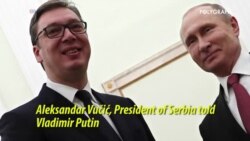((Editor’s correction of verdict, with additional context: Following letters from several readers, the verdict on this fact check has been changed from False to Misleading. While the initial verdict was directed at Vučić’s appreciation for Russia’s veto, and the current Serbian leader’s nod toward 1990s propaganda that contributed to ethnic violence and killing, we agree the 20th suffering and death should be acknowledged and highlighted.))
During a meeting in the Kremlin on May 8, Serbian President Aleksandar Vučić told his Russian counterpart Vladimir Putin that Serbs “are the people who suffered the most over the last century.” Vučić thanked Putin for saving Serbia from the “stigma of genocide” by vetoing a “British resolution in the U.N.”
The “British resolution” Vučić referred to was a draft U.N. Security Council resolution proposed jointly by Jordan, Lithuania, Malaysia, New Zealand, Britain, Ireland and the United States in 2015 calling for the actions of Serbian troops during the war in the Balkans to be recognized as “the crime of genocide, proven war crimes and crimes against humanity.”
On July 8, 2015, ten out of fifteen U.N. Security Council members voted for the resolution, four abstained and Russia vetoed it.
Based on documentary evidence, including photos and videos, the U.N. estimated that there were thousands of cases of sexual violence -- with victims on all sides --during the conflict in Bosnia and Herzegovina, including at Srebrenica, where Bosnian Serb troops executed 8,372 boys and men in just five days in July 1995. This happened despite the fact that Srebrenica was declared a “safe area” for refugees under United Nations protection.
The events described in the draft resolution took place in the Balkans during the series of violent conflicts in the 1990s, amid the breakup of Yugoslavia into independent states. The war in Bosnia and Herzegovina claimed hundreds of thousands of lives and displaced millions from their homes. It was followed by the Kosovo conflict, which broke out after the province’s majority Albanian population called for independence from Serbia.
On July 9, 2015, the European Parliament and the U.S. Congress adopted resolutions describing the Srebrenica crimes as genocide.
In 2010, the Serbian Parliament issued a declaration apologizing for the Srebrenica massacre.
Aleksandar Vučić’s description of the Serbs as the victims who suffered the most is not new: in fact, it echoes ex-Serbian leader Slobodan Milosevic, whose nationalist propaganda reportedly played a major role in the mass atrocities Serbian troops committed during the war.
As for Vučić’s description of the Serbs as the “the people who suffered the most over the last century,” according the “Bosnian Book of Dead,” an independent study conducted by the Research and Documentation Center in Sarajevo in the mid-2000s, 97,207 people were killed in the Bosnian war, 25 percent of whom were Serbs, 8 percent Croatians and 65 percent Bosnian Muslims.
20th Century Context:
The U.S. Holocaust Memorial Museum scholars estimate 169 million people were victims of mass atrocities worldwide in the 20th century and Serbs were among the victims.
At the epicenter at beginning of World War I, there is little doubt the Serb population was one of many that suffered among the worst atrocities committed by invading armies. The World War I encyclopedia managed by Freie Universität Berlin in Germany reports on the brutality of the Austro-Hungarian invaders who “treated the entire Serb civilian population as combatants or participants.” While the scholars say the extent of atrocities is not fully researched, estimates of the civilian death toll ranged from 3,500 up to 30,000.
During World War II, the fascist Ustasa government of Croatia slaughtered, by some estimates up to 2 million Serbs, Roma, and Jews in Croatia – “killings that were so brutal they appalled even the Nazis,” according to Globalsecurity.org, an oft-cited compilation of scholarship and military information and history. In Serbia, the German puppet regime tried to “reign in the violence,” though Nazi reprisals continued against the resistance.
The 1990’s wars over the breakup of Yugoslavia are considered to be “the bloodiest” since World War II. The Bosnia Serb push to create the Republika Srpska began “with the idea of creating an ethnically pure Serbian enclave in northern and eastern Bosnia.” The “ethnic cleansing” of Muslim enclaves resulted in “Europe’s first concentration camps since World War II.” While Croat and Muslim forces committed similar acts, there were “massive counts of rape and sexual assault of Muslim women” and “mass executions of Muslim men and boys of military age.” The Srebrenica massacre is the “most infamous” of these reports.
It is with this background context that Vučić thanked the Putin government for it’s 2015 veto of the U.N. genocide resolution.









